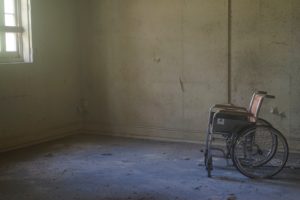Violence, self-destruction, despair and human rights violations are rampant in our world. We can choose our favorite flavor: Climate change, racial and ethnic problems, gender ideology, immigration issues, terrorism, food production and diet, religion, capitalism and the economy, and a multitude of other issues clamor for our attention.
Who is to blame?
Everyone? No one?
Our global social problems overwhelm me. They’re too big for one person to deal with.
As I explore blame, I’ll zoom in to an example from my own life.
A long time ago I married an abusive man, and he abused me. (Big surprise, right?) My experience of abuse was quite real. I realized his behavior was not okay. I realized domestic violence is a huge problem, and I realized it can happen to anyone.
I found a way out, and I could have stopped there and just carried the identity of a victim of domestic violence and an abusive man. It’s a big club. I could find validation, support groups, therapy and other assistance. I could compare stories with other victims, seek revenge, stalk his Facebook page, bad mouth him, have bad dreams and feel ashamed every time I flinch away from a sudden movement a man makes in my vicinity.
I could have turned my experience as an abused woman into a demon, a chronically bleeding wound, a source of darkness, fear and impaired trust. I could run from it, avoid it, try to forget it and stay stuck in power loss. I was victimized. It was unfair. That’s how the world works.
But what’s underneath that reality of being an abused woman? Why was I an abused woman?
Because men prey on women, men are entitled, it’s a man’s world and women are not granted equal power, recognition or rights.
It wasn’t my fault. I was a victim. End of story.
A victim is a person harmed as a result of a crime, accident, or other event or action. Notice that powerlessness is not part of that definition, which is paraphrased from Oxford Online Dictionary.
I was an abused woman because I thought that’s what I was worth. That’s my truth. I don’t shame myself over it, but I own it. All men do not prey on women. All men do not feel entitled. Men do not define the world unless women allow them to, and the only person who can give away my power and ignore my rights is me.
And, at various times in my life, I have.
Blaming is easy, and we all do it. Managing personal power is a lot of work, a daily practice if we want our lives to work well. Blaming is quick and socially acceptable, especially in this age of hyperreaction to any hint of victim shaming.
The problem is that blame is a dead end. It keeps us firmly fastened in what has befallen us rather than what we’re going to do now. We can blame all we like, but it doesn’t bring us justice, resolution or healing. It doesn’t help us understand the complexities of our situation. We can’t learn from blame. It’s not useful or productive in any way. Blaming is an abdication of responsibility, power and resilience.
This is even more true when we blame ourselves. Blaming myself is what put me in an abusive relationship in the first place. I am not responsible for the behavior and choices of the man I was with, but I chose to be with him – for a time. I believed it was what I deserved because of my guilt and shame over previous choices.
If we are victimized by a crime, accident, or other event or action, and all we can do is blame, we’re effectively embracing a victim mentality, and that kind of thinking goes nowhere.
Sooner or later, we’re all victims of something. Sometimes our own choices lead to our victimization, sometimes we get hurt through no fault of our own, and often the situation is a complex mixture of choices, actions, and events impossible to disentangle.
It’s what we do with our experience that counts. Are we going to blame someone or something and stay stuck, or take appropriate responsibility for ourselves and problem-solve?
We’re not responsible for what other people do or random events we’re caught up in, but we’re always responsible for what we do in response. Healthy boundaries help us discern the difference between the places we have power and the places we have none.
Taking responsibility is not the same as blaming. Responsibility is a powerful tool for problem solving. It’s forward-focused. Blame is backwards-focused and solves nothing.
Being or feeling victimized is no fun, and it’s not a place I want to pitch a tent and call home. I refuse to identify as a victim, and I don’t victimize myself or others. When I catch myself blaming, I know I’ve stepped out of my own power.
Being victimized is a teacher for me. It’s not about blame and shame. It’s about using the feelings and discomfort of the experience to learn, to grow, to find new resources and to reach out to other victims in a supportive, constructive way. Making a healthy contribution out of our experience of victimization heals our wounds and helps other victims find their way to healing. It helps us reclaim our dignity and power.
It’s a lot more work than blaming, which any toddler can do.
Blaming signals disempowerment, and I refuse to go back down that road. In a perfect world, we’d all be held accountable for our victimization of others, but it’s far from a perfect world, and the only choices I’m in charge of are my own.
I may be, at times, a victim, but I’m always in charge of my own power.
© 2021 – 2023, Jenny Rose. All rights reserved.




This touches my heart. You are anything but a victim. You are an inspiration to me and my daughter everyday. You have helped so many women find their power. You are amazing and need to continue to share your stories and share your road of emotional healing because it is so powerful. My life is forever changed because you are in it.
Thank you, Tori. You honor my life as well.